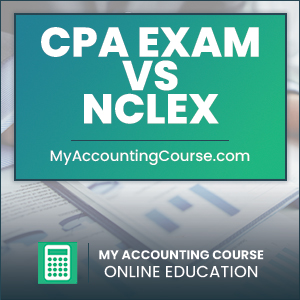 The Certified Public Accountant (CPA) Exam and the National Council Licensure Examination (NCLEX) are pivotal assessments for aspiring professionals in accounting and nursing, respectively. These exams differ significantly in purpose, structure, content, and the career paths they lead to.
The Certified Public Accountant (CPA) Exam and the National Council Licensure Examination (NCLEX) are pivotal assessments for aspiring professionals in accounting and nursing, respectively. These exams differ significantly in purpose, structure, content, and the career paths they lead to.
Whether you are exploring accounting or nursing, understanding the distinctions between the CPA Exam and the NCLEX can help you determine the right path for your aspirations.
This guide provides a detailed comparison of the CPA Exam and the NCLEX, shedding light on their unique characteristics to aid your decision-making process.
Overview of the CPA Exam
Contents
The CPA Exam is a professional licensure exam administered by the American Institute of Certified Public Accountants (AICPA). It evaluates a candidate’s knowledge and skills in accounting, auditing, taxation, and business concepts, ensuring readiness for the CPA designation.
Structure of the CPA Exam
The CPA Exam consists of four sections:
- Auditing and Attestation (AUD): Covers auditing procedures, ethics, and professional responsibilities.
- Business Environment and Concepts (BEC): Focuses on business operations, economics, and written communication.
- Financial Accounting and Reporting (FAR): Involves financial reporting standards, transactions, and accounting for various entities.
- Regulation (REG): Examines taxation, business law, and ethics.
Each section is four hours long, totaling 16 hours of testing. Candidates must pass all four sections within an 18-month rolling window.
Eligibility Requirements
To take the CPA Exam, candidates generally need:
- A bachelor’s degree.
- At least 150 credit hours of education, including accounting and business coursework.
Exam Focus
The CPA Exam emphasizes technical accounting knowledge, analytical skills, and the application of accounting principles to practical scenarios. It includes multiple-choice questions, task-based simulations, and written communication tasks.
Overview of the NCLEX
The NCLEX is a standardized exam required for licensure as a registered nurse (RN) or licensed practical/vocational nurse (LPN/VN) in the United States and Canada. Administered by the National Council of State Boards of Nursing (NCSBN), it evaluates a candidate’s readiness to practice safely and effectively as a nurse.
Structure of the NCLEX
The NCLEX is computer-adaptive, meaning the difficulty of questions adjusts based on the candidate’s performance. It includes two versions:
- NCLEX-RN: For registered nurse licensure.
- NCLEX-PN: For practical/vocational nurse licensure.
The number of questions ranges from 85 to 150 for the NCLEX-PN and 85 to 145 for the NCLEX-RN. The test covers categories such as:
- Safe and Effective Care Environment
- Health Promotion and Maintenance
- Psychosocial Integrity
- Physiological Integrity
Eligibility Requirements
Candidates must:
- Graduate from an approved nursing program.
- Meet state-specific licensure requirements.
Exam Focus
The NCLEX assesses clinical reasoning and decision-making skills, ensuring candidates can provide safe and competent care in real-world healthcare settings.
Key Differences Between the CPA Exam and the NCLEX
Purpose
- CPA Exam: Certifies individuals to work as licensed public accountants, focusing on accounting, auditing, and taxation.
- NCLEX: Licenses candidates to practice nursing, emphasizing patient care, safety, and clinical decision-making.
Structure
- CPA Exam: Consists of four separate sections taken individually over an 18-month period.
- NCLEX: A single adaptive test completed in one day, with the number of questions varying by performance.
Content
- CPA Exam: Focused on technical accounting and business-related topics.
- NCLEX: Covers nursing care, health promotion, and the ability to respond to clinical scenarios.
Career Pathways
- CPA Certification: Leads to roles in public accounting, auditing, taxation, financial analysis, and consulting.
- NCLEX: Qualifies candidates for nursing positions in hospitals, clinics, and other healthcare settings.
Preparation for Each Exam
CPA Exam Preparation
Preparing for the CPA Exam typically involves:
- Review Courses: Candidates use CPA review programs offering video lectures, practice questions, and task-based simulations.
- Time Commitment: Studying requires hundreds of hours, often spread over six to 12 months.
- Practice: Focused on mastering accounting concepts and applying them to practical problems.
NCLEX Preparation
Preparing for the NCLEX generally involves:
- Prep Materials: Review books, online courses, and practice exams tailored to the NCLEX format.
- Time Commitment: Intensive preparation usually spans two to three months post-graduation.
- Focus: Emphasis on clinical reasoning, patient safety, and application of nursing knowledge.
Pass Rates and Difficulty
CPA Exam
The CPA Exam has a pass rate of approximately 50% for each section. Its difficulty arises from the technical content and the requirement to pass all sections within an 18-month window.
NCLEX
Pass rates for first-time test-takers are typically around 80-90% for the NCLEX-RN and slightly lower for the NCLEX-PN. The adaptive nature of the exam makes it challenging, as it tailors questions to the candidate’s ability level.
Costs Associated with Each Exam
CPA Exam
Costs include:
- Application fees.
- Exam fees for each section.
- Review course expenses.
Total costs range from $1,500 to $3,000.
NCLEX
Costs include:
- Registration fees.
- Study materials and prep courses.
- State licensure application fees.
Total costs range from $500 to $1,200.
Choosing the Right Path
The decision between the CPA Exam and the NCLEX depends on your career aspirations:
Choose the CPA Exam if you are passionate about accounting, finance, and business. It’s ideal for those aiming to become auditors, financial analysts, or consultants.
Choose the NCLEX if you are driven to pursue a career in healthcare, providing patient care and contributing to the medical field.
Bottom Line
The CPA Exam and the NCLEX represent distinct and essential paths for accounting and nursing professionals. While the CPA Exam tests technical accounting skills across multiple sections, the NCLEX evaluates clinical decision-making and patient care in a single adaptive test. Both exams require rigorous preparation, discipline, and a commitment to excellence.
By understanding the differences between these exams, you can choose the path that aligns with your passions and career goals, setting yourself up for success in either the accounting or healthcare profession.


